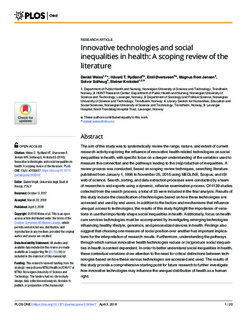| dc.contributor.author | Weiss, Daniel | |
| dc.contributor.author | Rydland, Håvard T. | |
| dc.contributor.author | Øversveen, Emil | |
| dc.contributor.author | Jensen, Magnus Rom | |
| dc.contributor.author | Solhaug, Solvor | |
| dc.contributor.author | Krokstad, Steinar | |
| dc.date.accessioned | 2018-04-17T12:59:03Z | |
| dc.date.available | 2018-04-17T12:59:03Z | |
| dc.date.created | 2018-04-04T09:24:10Z | |
| dc.date.issued | 2018 | |
| dc.identifier.issn | 1932-6203 | |
| dc.identifier.uri | http://hdl.handle.net/11250/2494524 | |
| dc.description.abstract | The aim of this study was to systematically review the range, nature, and extent of current research activity exploring the influence of innovative health-related technologies on social inequalities in health, with specific focus on a deeper understanding of the variables used to measure this connection and the pathways leading to the (re)production of inequalities. A review process was conducted, based on scoping review techniques, searching literature published from January 1, 1996 to November 25, 2016 using MEDLINE, Scopus, and ISI web of science. Search, sorting, and data extraction processes were conducted by a team of researchers and experts using a dynamic, reflexive examination process. Of 4139 studies collected from the search process, a total of 33 were included in the final analysis. Results of this study include the classification of technologies based on how these technologies are accessed and used by end users. In addition to the factors and mechanisms that influence unequal access to technologies, the results of this study highlight the importance of variations in use that importantly shape social inequalities in health. Additionally, focus on health care services technologies must be accompanied by investigating emerging technologies influencing healthy lifestyle, genomics, and personalized devices in health. Findings also suggest that choosing one measure of social position over another has important implications for the interpretation of research results. Furthermore, understanding the pathways through which various innovative health technologies reduce or (re)produce social inequalities in health is context dependent. In order to better understand social inequalities in health, these contextual variations draw attention to the need for critical distinctions between technologies based on how these various technologies are accessed and used. The results of this study provide a comprehensive starting point for future research to further investigate how innovative technologies may influence the unequal distribution of health as a human right. | nb_NO |
| dc.language.iso | eng | nb_NO |
| dc.publisher | Public Library of Science | nb_NO |
| dc.rights | Navngivelse 4.0 Internasjonal | * |
| dc.rights.uri | http://creativecommons.org/licenses/by/4.0/deed.no | * |
| dc.title | Innovative technologies and social inequalities in health: A scoping review of the literature | nb_NO |
| dc.type | Journal article | nb_NO |
| dc.type | Peer reviewed | nb_NO |
| dc.description.version | publishedVersion | nb_NO |
| dc.source.volume | 13 | nb_NO |
| dc.source.journal | PLoS ONE | nb_NO |
| dc.source.issue | 4 | nb_NO |
| dc.identifier.doi | 10.1371/journal.pone.0195447 | |
| dc.identifier.cristin | 1577132 | |
| dc.description.localcode | © 2018 Weiss et al. This is an open access article distributed under the terms of the Creative Commons Attribution License, which permits unrestricted use, distribution, and reproduction in any medium, provided the original author and source are credited. | nb_NO |
| cristin.unitcode | 194,65,20,0 | |
| cristin.unitcode | 194,67,25,0 | |
| cristin.unitcode | 194,14,30,0 | |
| cristin.unitcode | 194,65,20,15 | |
| cristin.unitname | Institutt for samfunnsmedisin og sykepleie | |
| cristin.unitname | Institutt for sosiologi og statsvitenskap | |
| cristin.unitname | NTNU Universitetsbiblioteket | |
| cristin.unitname | Helseundersøkelsen i Nord-Trøndelag | |
| cristin.ispublished | true | |
| cristin.fulltext | original | |
| cristin.qualitycode | 1 | |

